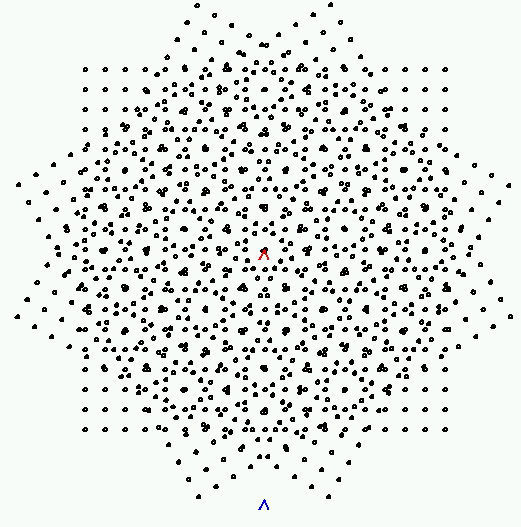Problem 1 (Marroquin Pattern)
The Marroquin pattern of order n is formed by superimposing three square arrays of points of size 2n + 1. Consequently, each array has an odd number of rows and columns. The arrays are rotated about the center (i.e., n + 1) point. The orientations of the arrays (relative to the x-axis) are 0, 60, and 120 degrees. You will write a function called marroquin which takes a single integer argument, n, and returns the Marroquin pattern of order n. Example:>(marroquin 9) >#<struct:graphic>

Problem 2 (Tail-Recursive Spiral)
The following program draws a spiral:
(define spiral
(lambda (angle len n)
(if (= n 0)
(adjoin)
(adjoin (bend angle)
(straight len)
(spiral angle (add1 len) (sub1 n))))))
Rewrite spiral so that it is tail-recursive. You are free to
use any helper-functions you may require.
Problem 3 (Macro Expansion)
Write a function, cond->if, which takes a cond expression as its argument and returns the equivalent expression using if's. For example:> (cond->if '(cond ((= x 1) 'foo) ((= x 2) 'bar) (else 'error))) (if (= x 1) (quote foo) (if (= x 2) (quote bar) (quote error))) >You may assume that every cond expression has an else part.
Problem 4 (Recognizing Tail Recursive Definitions)
The definition of a function, foo, is a <tail definition> if it has the following form:(define foo (lambda (<symbol>*) <tail wrt foo>))
where <symbol>* is zero or more symbols and an expression is <tail wrt foo> if it is not an application of foo:
<contains no foo applications>
or
if it is an application of foo to zero or more expressions which contain no applications of foo:(foo <contains no foo applications>*)
or
if all applications of foo are contained in expressions which are (themselves) tail recursive with respect to foo and which occur in any of the following contexts:
- (if <contains no foo applications> <tail wrt foo> <tail wrt foo>)
- (and <contains no foo applications>* <tail wrt foo>)
- (or <contains no foo applications>* <tail wrt foo>)
where <contains no foo applications> is an expression which contains no applications of foo, and <contains no foo applications>* is zero or more expressions which contain no applications of foo.
Write a function, tail-definition?, which takes an expression, expr, as an argument, and returns #t if the expression is a <tail definition> and #f otherwise. For example:
> (tail-definition? '(define fact (lambda (x acc) (if (= x 0) acc (fact (- x 1) (* x acc)))))) #t > (tail-definition? '(define fact (lambda (x) (if (= x 0) 1 (* (fact (- x 1))))))) #f > (tail-definition? '(define member? (lambda (item ls) (and (not (null? ls)) (or (eq? item (car ls)) (member? item (cdr ls))))))) #t >Hint: Divide and conquer. Write helper-functions, tail-wrt? and no-applications-of?. Both take a function name, fname, and an expression, expr, as arguments. tail-wrt? returns #t if expr is tail with respect to fname and #f otherwise. no-applications-of? returns #t if there are no applications of fname in expr, and #f otherwise.
Problem 5
Exercises 5.3, 5.6, 5.8 from Springer and Friedman.
Problem 6
The function list? takes an s-expression, s, as an argument and returns #t if s is a list and #f otherwise. Give a definition of the function, list-all?, which takes an s-expression, s, as an argument and returns #t if s is a list and all pairs in s are also lists. Otherwise, list-all? returns #f. For example,> (list-all? '(1 ((2 3)) (4)))) #t > (list-all? '(1 ((2 . 3)) (4)))) #fYou may use list? to define list-all?.
When You Should Hand It In
The above should be handed in Tues. March 11 by midnight. Start early! Problems 1 and 4 are quite challenging.
* This webpage is located at http://cs.unm.edu/~williams/cs257/homework4s03.html